An American Legacy in Belgium: Leuven Library
(Photo by Cheryl-Anne Millsap)
In the memory, we are walking down the wide stone steps--I must have been no more than five or six at the time--and I was holding my grandfather’s hand as we left an upper floor of the public library and made our way to the door. The building, with its ornate murals and elaborate carved wood, was hushed and filled with whispery voices and the unmistakable perfume of old books. It was a place of treasures and discovery and, before the advent of keywords and Googling as a verb, the place that held the key to the wider world. It was, although I could not have articulated this, a safe place.
The memory played in the corners of my mind as I walked across the square in the small city of Leuven, Belgium and my guide told me the story of the university library there. Picturesque Leuven is home to one of the oldest universities. A center of learning since the 15th century. But at the time of the first World War, the library - filled with priceless medieval books and manuscripts - was deliberately targeted, bombed and burned. And to deliberately destroy a library was, even in war, a violation of the code.
Visiting Europe one encounters many stories of war, especially the great wars. The scars of battles and bombings and the occupation of enemy troops still remain and remind most Americans of just how short new and relatively undisturbed our history is. It widens the gulf between our continents and our cultures. With our own civil war and the bombing of Pearl Harbor as the notable modern exceptions, we have always gone away to war. It has never come to us.
But the “new” library in Leuven is stitched into our own academic and social history in an unexpected way.
Herbert Hoover, who would later become the nations’s 31st president, was deeply affected by the plight of Belgians during World War I and he was involved in major relief efforts. It was his plan that schools and students across the United States would make it possible to rebuild the library and they did. From the pennies donated by small children and the dollars given by university students, the money was raised in his campaign and a new, grand, quietly defiant library was built on the square. It was dedicated in 1928, and etched into the stone exterior are the names of American schools and universities, large and small. Some well-known and other less renown.
I walked slowly around the building, reading the names of the schools, imagining the enthusiasm with which the students would have joined in the campaign. The pennies collected and the earnest contributions of adults and institutions. I wondered how many might have made the journey later, after yet another world war ravaged the tiny country, to see the name of their school carved into the soft stone.
I said goodbye to my guide and spent the rest of the day exploring the city on my own.
Leuven is a place of beautiful buildings, good food, artisan breweries and a sense of gentle intellectual history that is evident in the old colleges and the golden hue of the stone facades. But my mind kept coming back to the story of the library.
As I made my way back to the train station to catch the express back to Brussels, I crossed the square again. The angle of the sun had changed, washing the grand library building in a soft and subtle light. A tangible reminder of what people can do to - and for - one another.
Cheryl-Anne Millsap writes for The Spokesman-Review and is the editor of Spokane Metro Magazine. Her essays can be heard on Spokane Public Radio and on public radio stations across the country. She is the author of “Home Planet: A Life in Four Seasons” and can be reached at catmillsap@gmail.com
